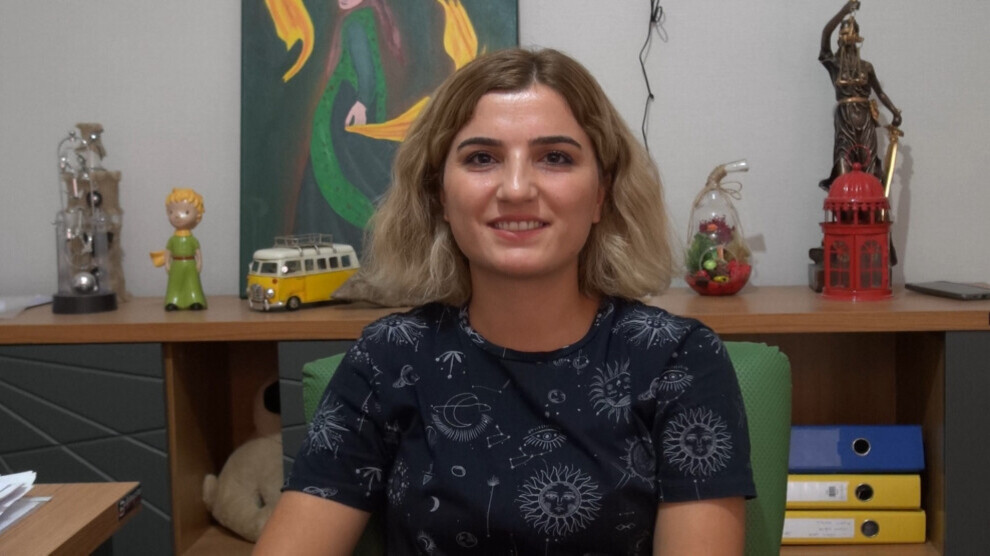Lawyer Polat: Femicides are a product of the system
Lawyer Berfin Polat particularly blames the politics of impunity, the language of the dominant discourse, and the politics of impunity for the rise of femicides in Turkey.
Lawyer Berfin Polat particularly blames the politics of impunity, the language of the dominant discourse, and the politics of impunity for the rise of femicides in Turkey.

Under the AKP government, the number of femicides in Turkey has risen continuously. The Free Women's Movement (TJA) speaks of an increase of 1400 percent in 18 years of AKP rule. In recent years in particular, the regime has intensified anti-women discourse and given patriarchal perpetrators of violence a tailwind by withdrawing from the Istanbul Convention on the Protection of Women from Violence. Lawyer Berfin Polat is on the board of the Rosa Women's Association in Amed (Diyarbakır) and spoke to ANF about the background and scale of the violence.
"The policy of impunity supports violence"
The lawyer stated that with the withdrawal from the Istanbul Convention, there is no longer even the concept of gender equality in Turkey, and parallel to this, acts of violence have continued to increase. An important factor in this is impunity, said Berfin Polat and continued, "Violence against women in Turkey is in a way supported by the policy of impunity, and the perpetrators are really patted on the back. We can observe time and again that perpetrators of the same crime receive different punishments. This is because there are so many different identities in Turkey."
Regarding the murder of HDP member Deniz Poyraz by a Turkish fascist last June in Izmir, Berfin Polat said, "Just as the Deniz Poyraz case shows, being a woman and a Kurd at the same time can be much worse. When you bear different oppressed identities, both the level of violence and the violence itself can change.”
Obstacles in the joint struggle against patriarchal violence
Polat emphasized the importance of uniting women's organizations against violence against women. At many points, however, she said, belonging to an identity other than Turkish is an obstacle: "Sometimes it is difficult to enter into cooperation when different identities are involved. This is because the degree of discrimination faced by the other identity varies. Apart from the female identity, belonging to another identity also changes the level of violence. If you have a Kurdish identity and a female identity, it's a very different problem."
"The killings are political"
Berfin Polat said that many femicides do not even appear in the media, "In July alone, almost twenty women were murdered. In addition, twelve women died in suspicious ways. Today, this phenomenon of violence has become a little more visible due to the common struggle of women and the courage they give each other. Experiencing violence and hiding it is a form of violence that you do to yourself. Violence and murders of women are completely political. They have increased as a result of government policies and judicial practices. Time and again, women affected by violence turn to the state, to the justice system, but in the end they are murdered anyway."
"They are patriarchal hate crimes"
Polat continued, "While women are murdered simply because they are women, the state does not protect them or punish the perpetrators. This is nothing but the annihilation of a gender. Moreover, this situation has become systematic. The state should look for the problem in itself at least as intensively as for the perpetrator. Women are developing, organizing themselves; the state cannot and will not tolerate that. That's why it keeps silent about violence and murders of women and takes sides with the perpetrator."
"Terms such as honor killing or rage killing should be avoided"
Polat also criticized the media coverage, saying: "Sometimes there are statements in the media that justify what the perpetrator has done. Potential murderers are thus encouraged in their actions. Femicides don't always need to be described in such detail. Potential perpetrators should not be given instructions on how to act. Nor should there be reports that take the perpetrator's perspective and reproduce the accusations and statements of the perpetrator. This is because the woman no longer exists to say anything in response to the perpetrator's accusations. Explanatory terms such as honor killing, rage, insanity, or illness should be avoided. There is no justification for violence and murder. Rather, the media should report where women can turn for protection before they are murdered. There needs to be a focus on the fact that women turn to the justice system or authorities for protection, but they are still murdered."